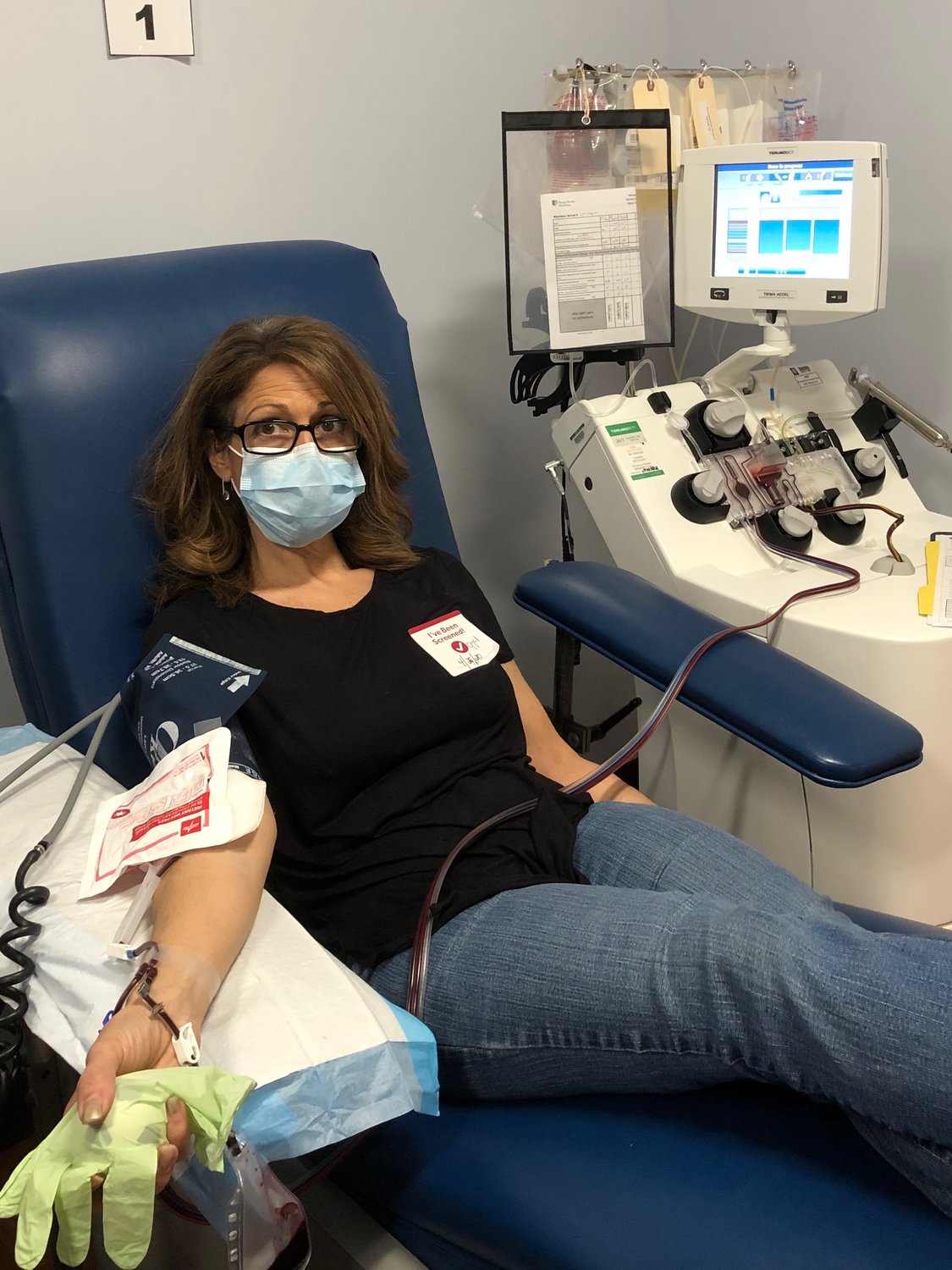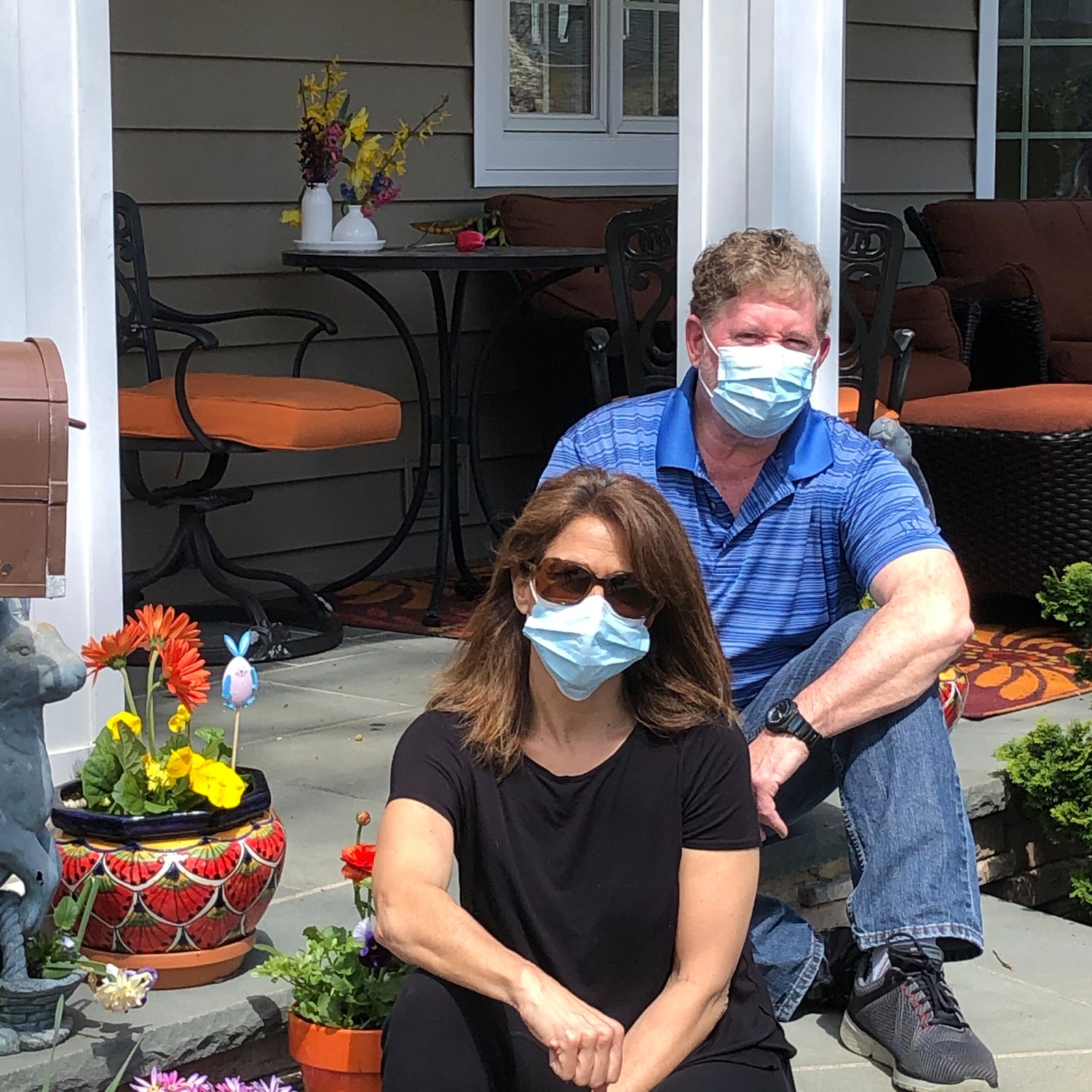Saturday, April 27, 2024
Grand Ave. M.S. teacher recovers from Covid-19, donates plasma to study
Experimental trial aimed at treating infected patients
Since overcoming coronavirus, Grand Avenue Middle School math teacher Julia Sabia Motley has participated in a study out of Stony Brook University Hospital that is aimed at helping others recover from the disease. Every two weeks, she is hooked up to an apheresis machine, which removes plasma, the liquid portion of the blood, from her body.
Plasma helps with immunity support, and contains antibodies that can potentially be used to kill the virus, according to a release from the university. There, a team of researchers, led by Dr. Elliott Bennett-Guerrero, will use the convalescent plasma in an experimental trial to treat patients battling Covid-19. Motley was one of the first people to donate to the study.
Signs of symptoms
Just a week after the Bellmore-Merrick Central High School District had its last day of in-person instruction, Motley and her husband, Sean, who live in Merrick, started experiencing coronavirus-like symptoms. The headaches and body aches began on March 18; three days later, their temperatures spiked. They lost their senses of taste and smell, and felt physically and mentally exhausted, but neither of them experienced respiratory symptoms, Motley said.
Because the drive-through Covid-19 facility at Jones Beach was only testing certain people initially — such as those who had traveled out of state or came into contact with a positive-testing person — "It took a long time to get tested," she said. The Motleys battled the virus from home and didn't leave for 18 days, not even to sit outside on the front porch.
On March 28, the couple got swabbed for coronavirus at CityMD in Bellmore. Although both tests came back positive, "I was feeling better by the time I finally went to get tested," Motley said. "I really wanted to make sure I had a positive test under my belt so I knew I’d be building up antibodies."
The Stony Brook study
On April 2, Stony Brook received approval from the U.S. Food and Drug Administration to offer convalescent plasma treatment to its patients through a randomized, controlled study, the release read.
"Our objective is to determine if plasma is safe and effective in treatment of hospitalized patients with Covid-19 infections," Bennett-Guerrero said in an interview with the Herald Life. "We're leveraging this amazing ability to collect antibodies from patients that have recovered to give to patients that are very sick."
Unlike other clinical trials, 80 percent of the patients in Bennett-Guerrero's study will receive plasma while the remaining 20 percent will act as the control group. This ratio, he said, will "benefit a larger number of people" if treatment is successful.
Motley's son, Mike, is an MD/PhD student at Stony Brook specializing in infectious diseases. When he told his parents that Bennett-Guerrero was looking for people who had recovered from Covid-19 to donate plasma, Motley filled out the study's screening survey.
Once a donor is screened and approved, they are scheduled for an in-person consultation. Removing plasma from the blood via apheresis takes about 40 minutes, Motley said; she described the procedure as "an odd feeling, like a cold sensation."
The process yields two to four 250-milliliter bags of plasma per donor, Bennett-Guerrero said. He added that during the study, each enrolled patient will be treated with two bags, or 500 milliliters, of plasma.
"We’ve been very fortunate in having a tremendous number of people volunteer to be plasma donors, and in the last week and a half we've ramped up enrollment of patients in the protocol."
Looking ahead
Bennett-Guerrero's team has screened more than 350 recovered donors since the study began, and has "fully qualified" 75 of those participants to donate plasma on a regular basis. So far, 31 patients from Stony Brook University Hospital have enrolled in the trial, which will take three months to complete, he said.
"Since it’s a double-blind study, we don’t have any anecdotal observations," he added. "It's too early to tell what the results will be."
Motley said she was confident that the study would be successful. "They still have to do studies to find out if people with antibodies are immune, but I trust the science," she said. "It’s really nice to do something to give back at this point, and I’m unbelievably appreciative."
For more information about Bennett-Guerrero's study, click here.
HELP SUPPORT LOCAL JOURNALISM
The worldwide pandemic has threatened many of the businesses you rely on every day, but don’t let it take away your source for local news. Now more than ever, we need your help to ensure nothing but the best in hyperlocal community journalism comes straight to you. Consider supporting the Herald with a small donation. It can be a one-time, or a monthly contribution, to help ensure we’re here through this crisis. To donate or for more information, click here.
Sponsored content
Other items that may interest you







